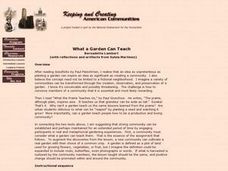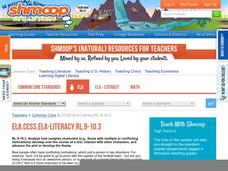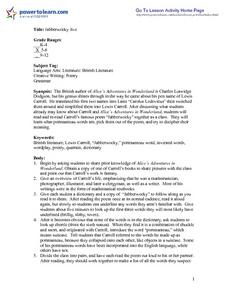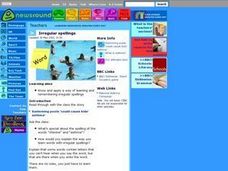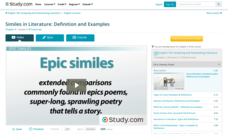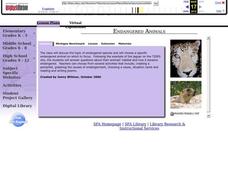Curated OER
What a Garden Can Teach
Learners read about land and gardening and create found poems from the text. They use the poems to design interpretation quilts of communal text.
Curated OER
The Nature of Haiku Poetry
Students brainstorm elements of nature art prints and photos. They identify the syllable count of Haiku and take a nature walk. They write Haiku poems while practicing the use of simile, alliteration, metaphor, and analogy to describe...
Curated OER
The Odyssey: A Deeper Appreciation
Students read "The Odyssey" and identify the ways it relates to their own lives. As a class, they also examine the history of the story and identify the various Greek gods and goddesses. In groups, they focus on the geography of the...
Curated OER
Background Knowledge and Making Connections
Students investigate what they know about the Holocaust. In this historical perspectives lesson, students complete KWL charts about Hitler and the Holocaust and create found poems on the topic prior to reading Wiesel's "Night."
Curated OER
Vanishing Environment: Exploring Changes in Landscape
To discover the impact of urbanization on the environment, learners compare landscape paintings from the past with contemporary photographs, create found poems from descriptions of artwork, design backyard or public garden spaces,...
Curated OER
Lesson: Weaving Words
A woven rug depicting birds and cornstalks becomes the inspiration for a instructional activity on critical thinking and creative writing. Learners analyze the symbolism found in the rug and then compose a descriptive paragraph or poem...
Texas Education Agency (TEA)
Cognates (English III Reading)
Did you know that "30-40 percent of all words in English have a related word in Spanish?" This fact launches an interactive study of cognates appearing the same in English and Spanish. Learners demonstrate what they have learned about...
Curated OER
Season Tiles: Ceramics Lesson
Each color holds its own feeling and these feelings are used to describe the four seasons. Youngsters create a color palate based on the four seasons, assigning various colors to each season. They each create four clay tiles, painting...
Shmoop
ELA.CCSS.ELA-Literacy.RL.9-10.3
Focus on complex characters with a lesson from a series that teaches individual skills from the Common Core. Specifically, this resource provides practice with standard RL.9-10.3. Get pupils thinking and talking about characters with the...
A to Z Teacher Stuff
Counting Valentines
This Valentine's Day, add a touch of festive flair to your math lesson with a booklet that combines counting, reading, and a sweet treat. Young mathematicians read a poem, count candy hearts, and record the amount of each color found.
Curated OER
"Jabberwocky" Jive
Pupils review the fantasy of Alice in Wonderland and discuss the author. After reading the poem, "Jabberwocky," they look up unfamiliar words in the dictionary. Working as partners, they create a list of "protmanteau" or invented words...
Hawaiʻi State Department of Education
ABA Form in Music
Patterns happen everywhere, in music, math, and language! Fourth graders listen to the "William Tell Overture" visualizing the patterns that they hear. They then discuss and write an ABA poem that matches the ABA form found in the music...
Curated OER
Presentations Come Alive!
Partners create oral presentations about a short story or poem incorporating audiovisual aids. Then they make presentations to their classmates. Linked story map will help guide readers' organization of their presentation;...
Curated OER
Preparing Students to Read the Aeneid
Teaching the Aeneid this year? Read this quick article to develop some plans and strategies for teaching the epic poem to your advanced learners.
Curated OER
Irregular Spellings
Students know and apply a way of learning and remembering irregular spellings. Students show where irregular spellings can be found everywhere in our society today. Students tie in irregular spellings to silent letters as well.
Curated OER
Similes in Literature: Definition and Examples
Be as romantic as a poetic. Appear as clever as Einstein. Wow others with your powers of observation by using similes to point out the similar aspects in two different things. This short video focuses on similes found in Shakespeare and...
Teacher Web
Poetic Sound Devices
As part of a study of poetic devices, kids are asked to identify the assonance, consonance, and alliteration found in a series of lines of poetry, and then identify the rhyme scheme and the types of rhyme found in Poe's "Annabel Lee,"...
Curated OER
The Last Lecture: Power Word Search
Powerful verbs. Significant nouns. Great adjectives. Readers of The Last Lecture conduct a power vocabulary search and create a list of words drawn from the text that will be used to craft a found poem.
Curated OER
Endangered Animals
Students listen to a teacher led lecture on jaguars, their habitats, and how they became endangered. Using a specified web site, they choose an endangered animal to research. After gathering information, students participate in...
Curated OER
Reading Comprehension: Fiction and Nonfiction
This resource is made up of a series of reading passages with accompanying questions. On the first page, learners read the definitions of both fiction and non-fiction. They examine four short selections before writing either fiction or...
Curated OER
Using Opening Lines as Writing Prompts
Help your writers get started with these hooks! Twenty-five opening lines from the "Lives" column in the New York Times Magazine act as prompts for creative writing. Have your learners choose one prompt and write an original essay....
Curated OER
Lesson Plan 3: Great Book, Gross Book
It's time for your scholars to become book reviewers! Start with a fun review of foods: are they good or gross? Learners apply these evaluation techniques to books, recording their thoughts on large pieces of butcher paper. Simply have...
Curated OER
Jazz in America
Students learn the basic elements of music and gain an understanding of the elements found in Jazz.
Curated OER
Rewriting Shakespeare
Have your learners play around with Shakespeare's language. In this plan, small groups examine and rearrange soliloquies from Othello, noting how the language changes and morphs. All groups have a chance to change each soliloquy, making...
